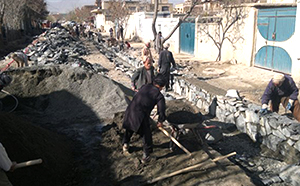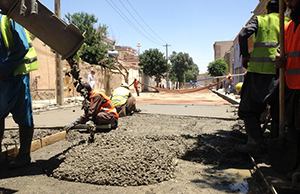Background

The estimated population of the Kabul City is now over 4 million and has almost doubled since 1999. The rapid population growth is likely to continue for the next decade and would reach about 6.5 million by the year 2025. This trend is creating serious environmental problems like water shortage, contamination of groundwater, traffic congestion, and air pollution. Returnees and rural-urban migration are causing further increase of mainly low-income population in Kabul City, which creates a pressure on existing basic services and infrastructure and an economic challenge to provide decent jobs for this growing population many of them with limited basic education and skills.
Objective(s)
The Kabul Solidarity Programme Phase 2 is people-driven, and is designed to support the achievement of all the three pillars (human security, governance, economic and social development) of Afghanistan National Development Strategy. The focus of intervention will be at the community and municipal levels where medium support will be provided to district and municipal levels and some nominal support at the central level.
Main Outputs

- • All 28 NDCs and 7 GDCs to be established and registered with the Kabul Municipality to be able to prepare, develop their action plans, and to implement community-driven sub-projects
- • Approximately 7,000 households in 28 NDCs and 7 GDCs will benefit from the improved infrastructure and access to services in 4 Districts of Kabul City
- • All 28 community-driven infrastructure projects to be implemented with involvement of municipal staff to improve infrastructure and access to services
- • All 21 women’s projects (3 activities x 7 GDCs) to be implemented to provide women with opportunities of skills development and income generation
Key expected achievements
- • Provision of an improved and sustainable access to basic services and prioritized infrastructure at the Neighbourhood Development Council and Gozar Development Council levels and reintegrating the population living in the areas into the society;
- • Enhancing governance and management capacity of the Kabul Municipality to: (a) absorb the influx of the migrated people, returnees and Internally Displaced Persons to help them reintegrate into the communities, and (b) effectively plan and manage urban development so as to make cities more livable; and
- • Provision of opportunities of on- and off-the-job training for, and transferring knowledge and experience to the municipal staff and community leaders to deliver sustainable and longer-term services.
- Overview
- Community Development Project: National Solidarity Programme (NSP)
- Afghanistan Urban Peacebuilding Programme (AUPP)
- Future of Afghan Cities Programme (FoAC)
- Kabul Solidarity Programme Phase 2
- Community-Based Municipal Support Programme
- Kabul Solidarity Programme
- Developing Irrigation Associations for On-Farm Water Management Project
- Behaviour Change Communication
- Assessment of Options for Community Benefit Sharing for CASA-1000
- Urban Solidarity Programme
- Reintegration of Returnees and IDPs through Policy, Planning and Targeted Assistance (EU8)
- Strengthening Municipal and Community Development in Lashkar Gah – Phase III
- Peace-Building in Afghanistan through Consolidation of Community Solidarity (PACCS)
- Reintegration of Returnees and Internally Displaced Persons (IDPs) through Policy, Planning and Targeted Assistance (EC7)
- Strengthening Municipal and Community Governance in Lashkar Gah - Phase II
- Community Empowerment and Development for Peace Building
- Learning for Community Empowerment Programme (LCEP Phase 2)
- Reintegration of Returnees and IDPs through Policy, Planning and Targeted Assistance (EC6)
- Behaviour Change and Communication
- Governance and Development Support Programme in Kandahar (GDSP)
- NSP - Spinboldak and Khakrez in District of Kandahar
- Upgrading Informal Settlements in Kandahar City
- Youth Empowerment Project (YEP)
- Inter-Communal Rural Development Project (IRDP)






































